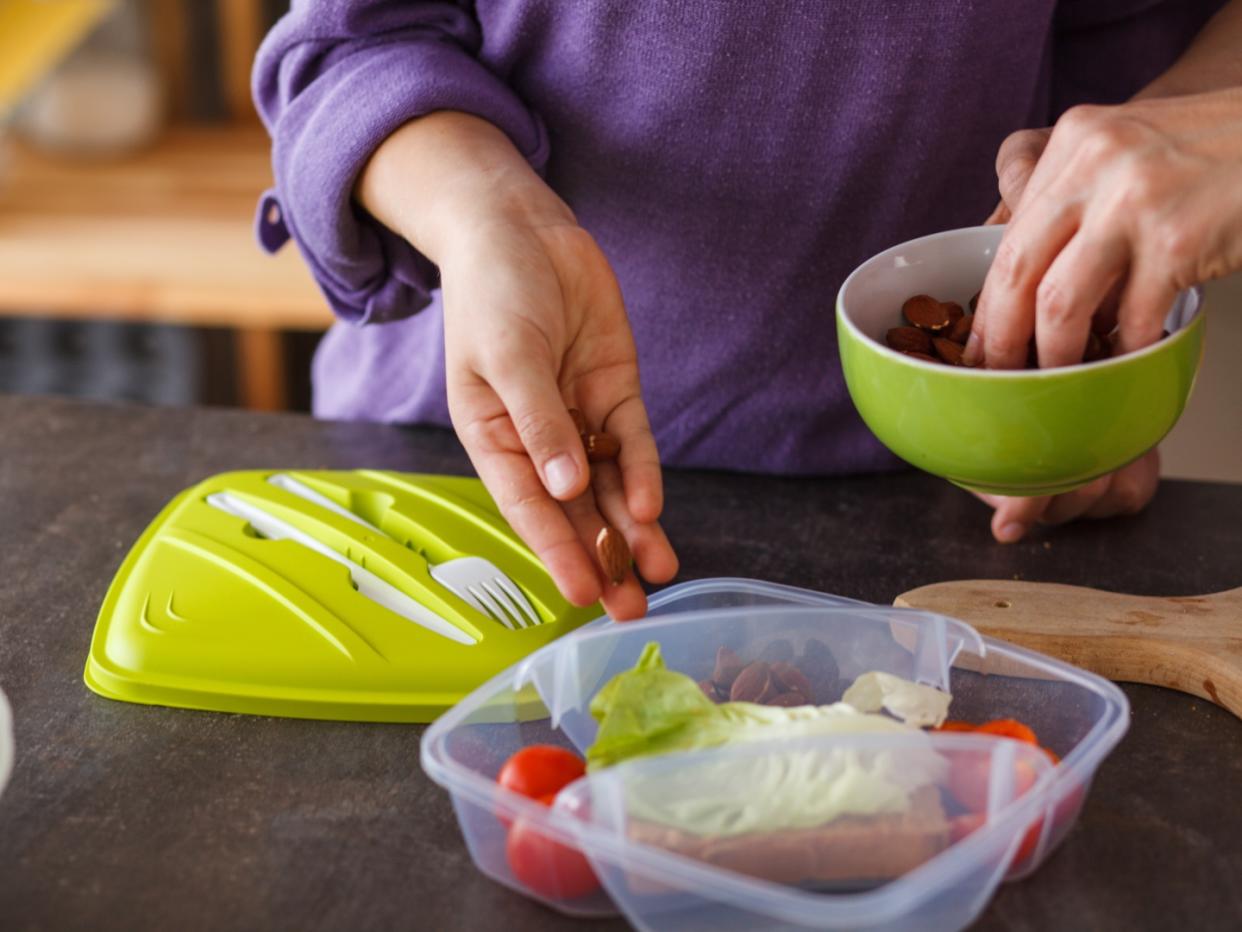If You're An ‘Almond Mom,' You're Damaging Your Children, Period

- Oops!Something went wrong.Please try again later.
The #AlmondMom is trending again on TikTok, this time referring to Goop founder Gwyneth Paltrow. She appeared on Dear Media’s The Art of Wellness podcast to detail her “wellness routine,” and, well, people thought it sounded pretty harmful.
Even if you’re not an avid TikTok user, you’ve probably heard of the “almond mom” label. The swarm of videos with #AlmondMom on the platform has led to discussions on other social platforms, news sites, and even family conversations at home in recent months. But ICYMI, an almond mom is a mother who encourages her daughters to diet with unhealthy strategies, including subsisting entirely on almonds. Or, in Paltrow’s case, bone broth and coffee.
More from SheKnows
In the podcast, Paltrow explains that she eats dinner “early in the evening” followed by a “nice intermittent fast.” Mornings are reserved for “things that won’t spike my blood sugar,” yet, her only example was “coffee.”
“But I really like soup for lunch,” she goes on. “I have bone broth for lunch a lot of the days.” Bone. Broth. Like…that’s it. Definitely not enough to satisfy hunger, much less enough to keep up with her “one hour of movement” every day or her 30 minutes of “dry brushing” then time in the sauna. Later, she refuels for dinner “according to paleo,” which means “lots of vegetables.”
Click here to read the full article.
“It’s really important for me to support my detox,” she adds.
@dearmedia #gwynethpaltrow shares her daily wellness routine on The Art Of Being Well, listen now 🎧 #wellnessroutine #healthandwellness #healthylifestyle #routines #goop #podcastclips
Paltrow, who is mom to daughter Apple, 18, and son Moses, 16, with Chris Martin, was called an “almond mom” by commenters. “Almond mom final boss,” one person wrote, garnering 39.2k likes. Another wrote, “The mother of all almond moms,” which received 46.7k likes.
“What’s she detoxing??? The bone broth???” another reasonably asked. Someone else pointed out, “Bone broth is not soup.”
“Is starving wellness?” another asked, when questioning why this was featured on a wellness-focused podcast. “This is 90s children’s trauma in a nutshell, no pun,” another wrote.
According to Glamour, Paltrow also had an IV of vitamins in during the interview. “I love an IV. I’m an early IV adopter,” she said, because it’s so hard to take a multivitamin, right?
Jess Sprengle, LPC, a therapist who specializes in eating disorders, told Teen Vogue in Feb. 2023 that teaching kids unhealthy thoughts about foods like almond moms do can increase their chance of developing disordered eating. “You may struggle to understand your body’s natural cues — for food, rest, exercise, etc.— and ultimately, learn that your body isn’t a trustworthy resource,” Sprengle told the outlet.
.@ashleygraham embodies fierce confidence in her latest unedited cover shoot. The model and mom of three has consistently advocated for body positivity throughout her career. https://t.co/FzDYwMKV7Z
— SheKnows (@SheKnows) August 30, 2022
She added, “‘Almond moms’ set their children up to be obsessed with food and their bodies in ways that are toxic and extremely harmful.” Millennials and Gen X have seen this in a number of ways in our own lives, as we continue to grapple with the diet culture we grew up in.
A recent video compilation of Yolanda Hadid, Real Housewives of Beverly Hills alum and mother to supermodels Gigi and Bella Hadid, brought the term “almond mom” top of mind. Yolanda having a hawk-like presence over a teenage Gigi’s eating habits and other factors contributing to her body composition led to a spike in the reference. The TikTok video begins with Gigi telling Yolanda “I’m feeling really weak; I had, like, half an almond.” Her mother responds with a super helpful, “Have a couple of almonds, and chew them really well.”
The video transitions to another clip from RHOBH, in which Yolanda is talking about Gigi playing volleyball. “Volleyball is a very masculine sport. Modeling is a very feminine thing,” she says, continuing, “And that means sometimes we have to give up things that we love to do.”
A solid step to cut off one toxic part of diet culture at the source. https://t.co/Gpeou8eECO
— SheKnows (@SheKnows) September 15, 2022
Yolanda tells Gigi, “You need to make a choice.” Gigi responds, “Modeling is my job. Volleyball is my sport.” In a confessional, Yolanda says, “[Women volleyball players’ bodies] are big and bulky, and I mean, they eat like men! I wanted her to develop as a woman.” So many things are wrong with this entire situation, from telling her daughter she can’t be a model if she’s muscular to making Gigi choose between two things she loves to implying that her daughter following an athletic path would prevent her from “developing as a woman.”
In another clip, Gigi is seen getting her hair and makeup done for a photoshoot, and she tells her mom, “I’m so excited for the food. Pretty much all of the food we’re eating is like a heart attack in a meal, but it’s gonna be so good.”
Yolanda, the almond mom that she is, responds, “You can have one night of being bad,” to which Gigi responds with a gut-twisting, “Yeah, I was actually really good this week.” Yolanda says, “Yeah… And then you gotta get back on your diet, though. Because, you know, in Paris and Milan, they like the girls just a tad on the skinny side.” We are positively banging our heads against the wall at that comment while fuming at the fact that teenage Gigi’s self-perception was partially shaped by her mother’s toxic opinions on body image.
The holidays can be filled with unwarranted comments about body image and diet culture. These powerful quotes will hopefully inspire healthier outlooks on the relationship with food. https://t.co/SE1TJvyAcF
— SheKnows (@SheKnows) December 25, 2021
Dr. Karla Lester, a pediatrician and childhood obesity expert, gave professional insight on Yolanda’s — and so many other mothers’ — tendency to shame their children’s bodies and eating choices, explaining to TODAY, “The almond mom phenomenon is rooted in fat phobia and internalized bias. She projects her own fears onto her children and in doing so, teaches them that she doesn’t accept them unless they’re at a weight that may be unattainable.”
Like many TikTokers have been doing in response to the trope garnering social media attention, one anonymous woman shared her personal experience regarding her own almond mom with SheKnows. She explained, “I grew up during the height of the fitness craze of the ’80s, and my own ‘almond mom’ used to let me diet with her. I went on my first diet in second grade — not because I was by any means overweight, but because my mom was dieting (she weighed just about 100 pounds at the time, by the way) and encouraged me to do it with her.”
There are some dangers to TikTok's diet culture but here are some ways you can approach your teen about the topic. https://t.co/DvkHGYv51z
— SheKnows (@SheKnows) August 23, 2021
She continued, “When I was in 7th grade, she took me to a counselor because she was afraid I was eating too much. I have middle schoolers of my own now, and I can see that I clearly wasn’t overeating — kids that age eat a ton because they’re growing, duh — but at the time I felt ashamed.”
As for the long-term effects of diet culture being ingrained in her from a young age? She shared, “Now I’m in my early 40s and have struggled with body image my whole life. Through the years I’ve bounced between the deprivation of anorexia and the shame of binge eating. It has taken me literal decades to unlearn the behaviors and disordered eating habits my mom ingrained in me as a child, and I still have a long way to go.”
She concluded, “I know my mom absolutely didn’t mean to do this to me; it wasn’t a malicious act on her part, just very misguided. She grew up the same way, with her mom and grandma constantly warning her that if she ate this or that she’d be fat, and she just wasn’t able to break the cycle.”
Sorry, but Body Positivity Isn't Making Us Fathttps://t.co/amb5p2JSUc
— SheKnows (@SheKnows) June 25, 2018
Dr. Deborah Gilboa, parenting and youth development expert, shared a variety of strategies for parents to foster a healthy relationship with food and body image in their children. She told TODAY, “As a parent, you want to help your child understand their body as one of their coolest, most interesting tools that they have for moving through the world,” she explained. “It allows them to do the things they enjoy doing like dancing and running. And in order for it to work best, it needs a balance of different fuels.”
Dr. Gilboa emphasized five tangible strategies that have been proven to improve fitness and nutrition in kids: Eating breakfast every morning; eating takeout no more than once a week; moving 60 minutes each day; no more than 2 hours of recreational screen time per day, and no more than 6 ounces of sweetened drinks per day.
She explained, “Those five interventions make a huge difference, and if you can do them before age 12, that’s when you’re not only building patterns, that’s when you’re still mostly in control of what they eat.”
.@khloekardashian uses this simple but effective technique to promote body positivity in her daughter, True! ♥️ https://t.co/5rsv4dj61E
— SheKnows (@SheKnows) October 14, 2021
Overall, Dr. Gilboa stresses the importance of avoiding shame or judgment when talking to kids about their body image. She suggests “[Talking] about their body in the third person because therapists have found it helps to reduce shame and increase objectivity,” continuing, “There’s data that shows these things help raise children who can be steered away from developing an eating disorder or experiencing unhealthy weight gain.”
In a society deeply embedded with toxic diet and body image culture, it’s so important to do the hard work of unlearning unhealthy habits, embracing nourishing techniques, and breaking the cycle of shame so as not to put our children through the same damaging lifestyle thrust on so many kids of “almond moms.”
The world has been collectively making strides toward a more inclusive, positive outlook on bodies and their many variations, but there’s still plenty of work to do to squash toxic takes on bodies that are anything other than very thin — and the almond mom TikTok boom is just the latest reminder.
Before you go, check out these celebrity moms who have embraced the changes in their bodies after giving birth.
Launch Gallery: Body Positive Books That Don't Feed Into Diet Culture or Toxic Eating Habits
Best of SheKnows
Sign up for SheKnows' Newsletter.
For the latest news, follow us on Facebook, Twitter, and Instagram.

